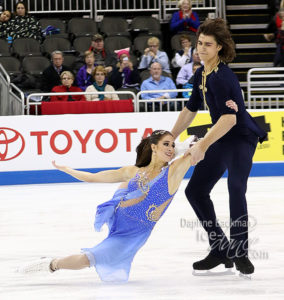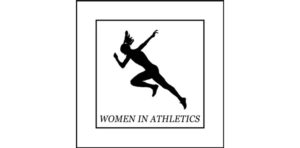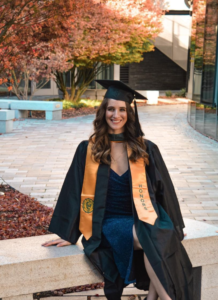
By Maura Sullivan Hill, Team FSO staff writer
Photos by Daphne Backman (Ice-Dance.com) and Elliana Pogrebinsky
For elite figure skaters, interviews and talking to the media are part of the package when you compete at national and international competitions. But a couple of your favorite skaters have turned the tables and become the interviewers themselves, hosting their own podcasts and interview series.
Figure Skaters Online’s Maura Sullivan Hill spoke with three podcasters, all focused on sharing personal stories, digging deeper, and making connections to help the next generation of skaters. In the second part of her three-part series called “On the AIr”, Maura talks with 2017 U.S. pewter medalist Elliana Pogrebinsky on how she’s empowering women athletes through a web and interview series.
For former Team USA ice dancer Elliana Pogrebinsky, it took leaving the sport she loved to see some of its flaws — and ignite a drive to change them.
“It started off last year. A lot of the girls that I used to skate with were coming out on Instagram, saying that they have experienced eating disorders in the past. And only now, once they stopped skating, they started searching for help and understanding it’s a really big problem and wanting to share their stories,” says Pogrebinsky, who competed with Alex Benoit at the highest levels of ice dancing from 2012 until her retirement in 2018. “To me, it gave the incentive where, one, I didn’t want women to have to wait until they were retired to finally understand that the way they have been going about their sport — and the way they have been feeling about themselves — has been wrong this whole time. And I also wanted to give a better platform that could potentially reach more people, where they could share their stories and in addition to that, where we could help educate at the same time.”
As her skating peers were sharing their stories, Pogrebinsky was studying kinesiology, which is the study of human movement, at the University of San Francisco (USF). She combined the perspective from her competitive skating career and the science from her education to create Women in Athletics, a website and interview series that aims to create change for women in sports. She wanted to have a space for skaters who have been there to share their stories, and for qualified health professionals to give reliable advice.
Their goal, as stated on her site, is to: “[bring] attention to topics often faced in sports such as the female triad (eating disorders, menstrual disturbances, bone mineral loss), burnout, mental health, lack of strength training. I hope to create change in the community to instill more incentive for coaches, parents, and officials to become educated in the fields of strength and conditioning, nutrition, sport psychology, and anatomy and physiology.”
The site includes a resource page of organizations and health professionals that skaters and other athletes can reach out to for help. “Now there’s a platform where I can bring on qualified health care professionals and say, well, this skater came out saying that they have an eating disorder. Now here’s a professional to give you their insight as to what can be done to start working on it earlier, especially because a lot of skaters don’t know what qualifications to look for in a health care professional when they are looking for help,” she says.
For Pogrebinsky, it was about finding a way to give back to the athletic community, and specifically figure skating, in a way outside of coaching.
“I studied kinesiology in school with the intention of helping give back. The goal was to give a broad understanding — to athletes, parents, coaches — of anatomy and physiology, the importance of working out in a gym, of nutrition, sports psychology, really anything that goes into an athlete’s entire life, when they are in a sport,” she says. “And making sure [the information] is coming from qualified health care professionals, rather than looking on the internet for any information that you might find. I wanted to be that person that athletes could come to and just get help with whatever they wanted, whether it was in the gym, or nutrition advice, or just, you know, be a helping hand that maybe they don’t have somewhere else in their life.”
 In addition to the resources on her website, Pogrebinsky has the interview series on her Women in Athletics YouTube channel, where she has interviewed the likes of 2010 U.S. Champion and Olympian Rachael Flatt and current Team USA competitors including 2019 U.S. Pairs Champion Ashley Cain-Gribble and three-time U.S. Ice Dance Champion Madison Hubbell. Outside of skating, she’s hosted an athletic trainer, ballroom dance coach, licensed clinical counselor and a strength and conditioning coach.
In addition to the resources on her website, Pogrebinsky has the interview series on her Women in Athletics YouTube channel, where she has interviewed the likes of 2010 U.S. Champion and Olympian Rachael Flatt and current Team USA competitors including 2019 U.S. Pairs Champion Ashley Cain-Gribble and three-time U.S. Ice Dance Champion Madison Hubbell. Outside of skating, she’s hosted an athletic trainer, ballroom dance coach, licensed clinical counselor and a strength and conditioning coach.
Flatt shared not only her experiences as a skater, but her expertise from undergraduate and graduate studies in psychology specializing in eating disorders. Pogrebinsky says she relates to each of the skaters she interviews.
“Unfortunately, it’s all so similar, where you just hear the same variations of things over and over again. It’s almost always going to be about aesthetics and girls being told that they need to look a certain way in order to be successful, whereas, in fact, that is not true at all,” she says. “It’s athletes being told that they have to fuel themselves in different ways based on aesthetics, which is also wrong. Because if you’re an elite athlete, you’re fueling yourself for the purpose of performing your sport. You can’t try and look like a model while skating four-minute programs — those two don’t coincide together.”
Pogrebinsky graduated from USF in December of 2020 and lives in Campbell, California, where she works as a personal trainer at 49ers FIT. And she’s also working on a new project, a spinoff of sorts for Women in Athletics. It’s called the Sustainable Sports Alliance.
“The goal is to travel to either different rinks or sports facilities and help inform them about very similar topics as to those covered in Women in Athletics, but more as a seminar,” Pogrebinsky says. “So rather than inviting people onto my YouTube Channel and just talking to them, this is a little bit more proactive. We’re actually going to them, creating a presentation, sitting the athlete or parents down and giving them their toolbox so that they can keep going in their sport having the right information.”
Her hope for Sustainable Sports Alliance is to give athletes more support and knowledge earlier in their careers, so she’s tailoring the presentation to younger athletes. “A lot of times when athletes get onto an international team, they’re a bit older and they already come with years of bad habits. So what we’re trying to do with Sustainable Sports Alliance is give them the information so that they can, as early as possible, start forming the right habits. And that’s going to help them be an elite athlete for as long as possible.”
Check out Pogrebinsky’s interview series and other health resources on her website, and follow along as she launches Sustainable Sports Alliance on their Instagram account, @sustainable.sports.alliance.
Stay tuned for the third-part of our “On the Air” series later this week! To read the first part of our “On the Air” series with 2014 Olympian Polina Edmunds, click here.
